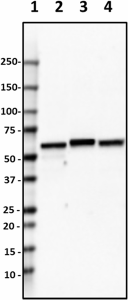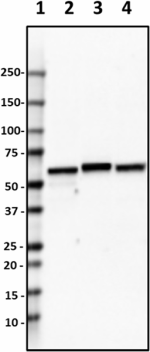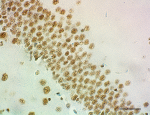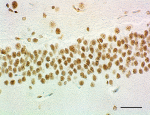- Clone
- 4H2-D5-E9 (See other available formats)
- Regulatory Status
- RUO
- Other Names
- Transducin Beta Like 1 X-Linked, F-Box-Like/WD Repeat-Containing Protein TBL1X, SMAP55, EBI
- Isotype
- Mouse IgG2b, κ
- Ave. Rating
- Submit a Review
- Product Citations
- publications

-

Western blot of purified anti-TBL1 antibody (4H2-D5-E9). Lane 1: Molecular weight marker; Lane 2: 10 µg of human HEK293 cell lysate; Lane 3: 10 µg of mouse NIH3T3 cell lysate; Lane 4: 20 µg of rat PC12 cell lysate. The blot was incubated with 1.0 µg/mL of the primary antibody overnight at 4°C, followed by incubation with HRP-labeled Goat anti-mouse IgG (Cat. No. 405306). Enhanced chemiluminescence was used as the detection system. -

IHC staining of purified anti- TBL1 antibody (4H2-D5-E9) on formalin-fixed paraffin-embedded mouse brain tissue. Following antigen retrieval using Sodium Citrate H.I.E.R (Cat. No. 928502), the tissue was incubated with 5.0 µg/mL of the primary antibody overnight at 4°C. BioLegend’s Ultra Streptavidin (USA) HRP Detection Kit (Multi-Species, DAB, Cat. No. 929901) was used for detection followed by hematoxylin counterstaining, according to the protocol provided. The image was captured with a 40X objective. Scale Bar: 50 µm -

IHC staining of purified anti- TBL1 antibody (4H2-D5-E9) on formalin-fixed paraffin-embedded rat brain tissue. Following antigen retrieval using Sodium Citrate H.I.E.R (Cat. No. 928502), the tissue was incubated with 5.0 µg/mL of the primary antibody overnight at 4°C. BioLegend’s Ultra Streptavidin (USA) HRP Detection Kit (Multi-Species, DAB, Cat. No. 929901) was used for detection followed by hematoxylin counterstaining, according to the protocol provided. The image was captured with a 40X objective. Scale Bar: 50 µm
| Cat # | Size | Price | Save |
|---|---|---|---|
| 869701 | 25 µg | ¥23,320 | |
| 869702 | 100 µg | ¥60,720 |
TBL1 is a protein that has sequence similarity with WD40 repeat-containing protein family. TBL1 plays an essential role in signal transduction, gene regulation, vesicle trafficking, and cytoskeletal arrangement through protein-protein interactions. TBL1 is also found as a component of nuclear receptor corepressor complexes through interaction with histone deacetylase 3, and is involved in Notch signaling. It is associated with diseases including ocular albinism and atrial septal defect 4.
Product DetailsProduct Details
- Verified Reactivity
- Human, Mouse, Rat
- Antibody Type
- Monoclonal
- Host Species
- Mouse
- Immunogen
- Purified recombinant human TBL1 protein fragments expressed in E.coli.
- Formulation
- Phosphate-buffered solution, pH 7.2, containing 0.09% sodium azide.
- Preparation
- The antibody was purified by affinity chromatography.
- Concentration
- 0.5 mg/mL
- Storage & Handling
- The antibody solution should be stored undiluted between 2°C and 8°C.
- Application
-
WB - Quality tested
IHC-P - Verified - Recommended Usage
-
Each lot of this antibody is quality control tested by Western blotting. For Western blotting, the suggested use of this reagent is 1.0 - 2.0 µg/mL. For immunohistochemistry on formalin-fixed paraffin-embedded tissue sections, a concentration range of 5.0 - 10 µg/mL is suggested. It is recommended that the reagent be titrated for optimal performance for each application.
- RRID
-
AB_2820178 (BioLegend Cat. No. 869701)
AB_2820178 (BioLegend Cat. No. 869702)
Antigen Details
- Structure
- TBL1 is a 577 amino acid protein with a predicted and observed molecular mass of ~62 kD.
- Distribution
-
Tissue Distribution: Brain, kidney, liver, heart, and lung
Cellular Distribution: Nucleus - Function
- TBL1 is involved in the regulation of gene expression, RNA processing, vesicle trafficking, and cytoskeleton assembly.
- Interaction
- HDAC3, Notch1
- Cell Type
- Neurons
- Biology Area
- Cell Biology, Neurodegeneration, Neuroscience, Signal Transduction
- Molecular Family
- Cytoskeletal Proteins, Nuclear Markers
- Antigen References
-
- Perissi V, et al. 2004. Cell. 116(4):511-26.
- Li J, et al. 2008. Nat Cell Biol. 10(2):160-9.
- Gene ID
- 6907 View all products for this Gene ID 21372 View all products for this Gene ID 302711 View all products for this Gene ID
- UniProt
- View information about TBL1 on UniProt.org
Other Formats
View All TBL1 Reagents Request Custom Conjugation| Description | Clone | Applications |
|---|---|---|
| Purified anti-TBL1 | 4H2-D5-E9 | WB,IHC-P |
Compare Data Across All Formats
This data display is provided for general comparisons between formats.
Your actual data may vary due to variations in samples, target cells, instruments and their settings, staining conditions, and other factors.
If you need assistance with selecting the best format contact our expert technical support team.











Follow Us